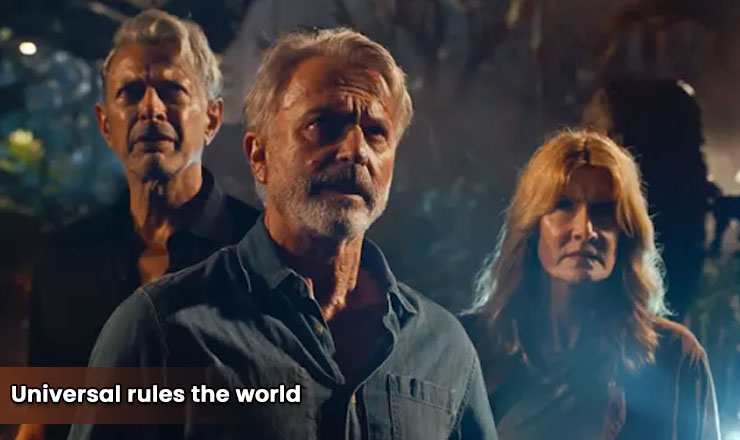With records being broken all summer long, it was the season that proved what many of us already knew: the cinema experience industry isn’t dead. In fact, it’s never looked this alive. But the number of misses exceeded the number of hits to show that not everything is as healthy everywhere.
Tom Cruise is the dethroned King of Hollywood:
Top Gun: Maverick, an expensive, long-delayed successor to a 1980s movie that wasn’t exactly asking for one (announced in 2010, filmed in 2018), was released with sensible caution. While the first Mission: Impossible film has a definite place in Hollywood history, it hasn’t had much of a second life with the introduction of streaming due to Tom Cruise’s fluctuating box office success outside of the Mission: Impossible flicks. There were stunned looks on everyone’s faces when, back in May, it not only had a big opening but a greater opening than any movie Cruise had ever featured in. It then took off for the remainder of the summer, earning $1.3 billion worldwide and counting.
Rightwingers made the ridiculous claim that the film’s success was due to it being pro-America and “anti-woke” (a ridiculous claim that doesn’t match up with past blockbuster successes that have embraced more diversity), but its success can actually be attributed to two factors. First off, Maverick had a far simpler entrance point for younger, less seasoned audiences than other sequels to revived classics. It’s a movie about flying planes and people who fly them, and unlike recent Halloween blockbusters that have been retconned, it doesn’t rely on a complicated backstory like the Terminator franchise did (one could enjoy it as a standalone film without having seen the original). Second, and perhaps most importantly, it displayed Cruise’s revitalized star power, serving as a reminder that audiences continue to flock to the 60-year-old actor when he plays to his strengths (charming, rule-breaking, and simplicity-free). Sandra Bullock, another 90s A-lister, scored a $190 million global hit with the adventure comedy The Lost City this Spring.
Breakouts struggled to break out:

While superheroes and their incredible stunts are typically associated with the summer, it’s also a time when many of us become completely weary of them. As a result, more and more indie films are being released every year to serve as much-needed counterprogramming in the US. Won’t You Be My Neighbor? and Midsommar became popular in recent years. This year, a lengthy list of low-budget non-franchise films all intended to provide relief from product placement and post-credits cameos., Eighth Grade, and Sorry to Bother You all successfully broke out of the margins. It turned out to be more of a bloodbath than what had been hoped for. Mr. Malcolm’s List, a historical romance, Watcher, a thriller about stalkers, Men, Cronenberg’s Crimes of the Future, Vengeance, BJ Novak’s satire, Marcel the Shell with the Shoes on, a well-reviewed fantasy, and Mack & Rita, a comedy about body swapping starring Diane Keaton, all struggled to gain attention.
A trip to the multiplex became less of a requirement as a result of the season’s streaming premieres, which included Hustle, Spiderhead, Father of the Bride, Prey, and The Grey Man. The overarching message of the summer may have been that cinema is back in full force, but audiences were still primarily craving Imax-level spectacle above all else. But although independent studios had trouble attracting viewers to purportedly “adult” movies.
Universal rules the world:

While Paramount won the top place for the summer and possibly the entire year, Universal was the true champion of the period. This week, the business surpassed $3 billion for the year as a whole, marking the first time a studio has done it since before 2019. Jurassic World: Dominion, the second highest-grossing movie of the year with just under $1 billion in the worldwide box office, is in the run despite receiving mostly unfairly negative reviews. The animated adventure The Bad Guys, The Black Phone, and Nope all had successful summers at the studio.
Since then, there has been more selectivity regarding which picture goes where and when, which is part of the reason for their boom season. Therefore, larger films like the Jurassic World and Minions installments have not yet been released because they continue to earn money at the movie office, even if The Bad Guys and The Black Phone were free at home on Peacock in seven weeks. In addition to Disney, Universal is the studio with the most lucrative ongoing franchises. With the upcoming sequels to Fast & Furious 10, Puss in Boots: The Last Wish, and Halloween Ends, their winning streak is expected to last until next summer.
Studio counter-programming paid off:

Baz Lurhmann’s Elvis was the first and biggest. The director is experienced in turning prestige prize dramas into summer blockbusters (The Great Gatsby and Moulin Rouge were all mid-year smashes), but critics were nonetheless taken aback by the number of people who were deeply moved by a 159-minute Elvis Presley biopic. Ingeniously, under the new management of Discovery, the movie wasn’t made available on HBO Max 45 days after release like previous Warner titles but instead continues to play in theatres while being rented for a high price. The movie has made over $260 million worldwide to date. This is a sizable number given important disclaimers.
Although not on the same scale, the Where the Crawdads Sing adaption, which Reese Witherspoon produced, also succeeded in becoming a well-liked summertime diversion, earning $86 million globally and counting. The audience was predominately made up of women notwithstanding the negative reviews and disturbing controversy surrounding the author Delia Owens. Although neither could be described as particularly challenging or cerebral, the success of both was a reassuring sign that audiences will still flock to the movies in droves for non-franchise titles. Both transformed well-known properties into glitzy must-see-on-the-big-screen events.
The death of Marvel has been greatly exaggerated:

Thor: Love and Thunder and Doctor Strange and the Multiverse of Madness, two Marvel movies released this season, both failed to gross $1 billion worldwide and received mediocre reviews (both had a B+ Cinema score from critics and audiences, down from As for the previous iterations). It was tempting to conclude that this was the beginning of the end for the business’ most consistent hit-maker, but with the first film sitting at number three on the 2022 global box office chart with a whopping $954 million and the second at number six with $721 million and counting, it’s prudent to wait before making any rash predictions. Both films’ failure to obtain one of the highly sought-after international release slots in China is a major factor in why they fell short of the magic $1 billion mark. While there were rumors that LGBT themes in Thor 4 were what led to that specific ban, Doctor Strange 2 was reported to have offended authorities with a reference to the Epoch Times, a publication that criticised the Chinese Communist party.
Due to the fact that both movies outperformed the movies that came before them in the US and gave the market a lift following Eternals’ dismal performance the previous year. However, quality control is becoming more and more of a problem. Hopefully, this will change with the release of Ryan Coogler’s much anticipated Black Panther sequel later this year. The filmmaker, who is already responsible for the most well-liked MCU movie to date, might be able to lead the series into a more noble future.